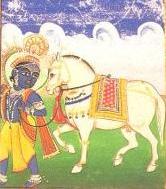Hindu eschatology

Hindu eschatology is a complex aspect of Hinduism that deals with the end of the world and the ultimate destiny of the universe. It is deeply intertwined with the concepts of karma, dharma, samsara (the cycle of rebirth), and moksha (liberation from the cycle of samsara). Unlike many Western eschatological perspectives, Hindu eschatology is not linear but cyclical, reflecting the broader Hindu understanding of time and existence.
Concepts and Beliefs[edit]
Hindu eschatology is primarily based on the concept of Yuga, which refers to an age within a four-age cycle. These ages are the Satya Yuga (Age of Truth), Treta Yuga, Dvapara Yuga, and Kali Yuga (Age of Darkness). Each Yuga is characterized by a gradual decline in dharma, morality, and human longevity, with the Kali Yuga being the final and most degenerate age. The current age, according to Hindu belief, is the Kali Yuga.
Kali Yuga[edit]
The Kali Yuga is often associated with moral decay, societal collapse, and the disintegration of dharma. It is said that during this time, rulers will become unreasonable, individuals will focus solely on personal gain, and the social order will be upended. Despite its negative connotations, the Kali Yuga is also seen as a time of potential spiritual growth, as individuals have the opportunity to strive for moksha against greater odds.
Cosmic Cycle[edit]
At the end of the Kali Yuga, it is believed that the world will undergo a transformative destruction, leading to the renewal of the cosmos and the beginning of a new Satya Yuga. This cycle of creation, maintenance, and destruction is overseen by the Trimurti: Brahma (the creator), Vishnu (the preserver), and Shiva (the destroyer).
Philosophical Interpretations[edit]
Hindu eschatology is not only concerned with the end of the physical world but also with the spiritual evolution of humanity. The ultimate goal is not to escape the end of the world but to achieve liberation (moksha) from the cycle of samsara. This liberation is achieved through adherence to dharma, spiritual practice, and the pursuit of knowledge.
Modern Interpretations[edit]
In contemporary times, Hindu eschatological concepts have been interpreted in various ways, reflecting concerns about environmental degradation, social injustice, and global conflicts. Some see the current state of the world as indicative of the Kali Yuga and emphasize the importance of spiritual awakening and ethical action to mitigate the negative aspects of this age.
Conclusion[edit]
Hindu eschatology offers a unique perspective on the end of the world, characterized by its cyclical view of time and emphasis on spiritual liberation. It provides a framework for understanding the challenges of the present age and encourages individuals to pursue righteousness and spiritual growth.

This article is a Hinduism-related stub. You can help WikiMD by expanding it!
Ad. Transform your life with W8MD's Budget GLP-1 injections from $49.99


W8MD offers a medical weight loss program to lose weight in Philadelphia. Our physician-supervised medical weight loss provides:
- Weight loss injections in NYC (generic and brand names):
- Zepbound / Mounjaro, Wegovy / Ozempic, Saxenda
- Most insurances accepted or discounted self-pay rates. We will obtain insurance prior authorizations if needed.
- Generic GLP1 weight loss injections from $49.99 for the starting dose of Semaglutide and $65.00 for Tirzepatide.
- Also offer prescription weight loss medications including Phentermine, Qsymia, Diethylpropion, Contrave etc.
NYC weight loss doctor appointmentsNYC weight loss doctor appointments
Start your NYC weight loss journey today at our NYC medical weight loss and Philadelphia medical weight loss clinics.
- Call 718-946-5500 to lose weight in NYC or for medical weight loss in Philadelphia 215-676-2334.
- Tags:NYC medical weight loss, Philadelphia lose weight Zepbound NYC, Budget GLP1 weight loss injections, Wegovy Philadelphia, Wegovy NYC, Philadelphia medical weight loss, Brookly weight loss and Wegovy NYC
|
WikiMD's Wellness Encyclopedia |
| Let Food Be Thy Medicine Medicine Thy Food - Hippocrates |
Medical Disclaimer: WikiMD is not a substitute for professional medical advice. The information on WikiMD is provided as an information resource only, may be incorrect, outdated or misleading, and is not to be used or relied on for any diagnostic or treatment purposes. Please consult your health care provider before making any healthcare decisions or for guidance about a specific medical condition. WikiMD expressly disclaims responsibility, and shall have no liability, for any damages, loss, injury, or liability whatsoever suffered as a result of your reliance on the information contained in this site. By visiting this site you agree to the foregoing terms and conditions, which may from time to time be changed or supplemented by WikiMD. If you do not agree to the foregoing terms and conditions, you should not enter or use this site. See full disclaimer.
Credits:Most images are courtesy of Wikimedia commons, and templates, categories Wikipedia, licensed under CC BY SA or similar.
Translate this page: - East Asian
中文,
日本,
한국어,
South Asian
हिन्दी,
தமிழ்,
తెలుగు,
Urdu,
ಕನ್ನಡ,
Southeast Asian
Indonesian,
Vietnamese,
Thai,
မြန်မာဘာသာ,
বাংলা
European
español,
Deutsch,
français,
Greek,
português do Brasil,
polski,
română,
русский,
Nederlands,
norsk,
svenska,
suomi,
Italian
Middle Eastern & African
عربى,
Turkish,
Persian,
Hebrew,
Afrikaans,
isiZulu,
Kiswahili,
Other
Bulgarian,
Hungarian,
Czech,
Swedish,
മലയാളം,
मराठी,
ਪੰਜਾਬੀ,
ગુજરાતી,
Portuguese,
Ukrainian